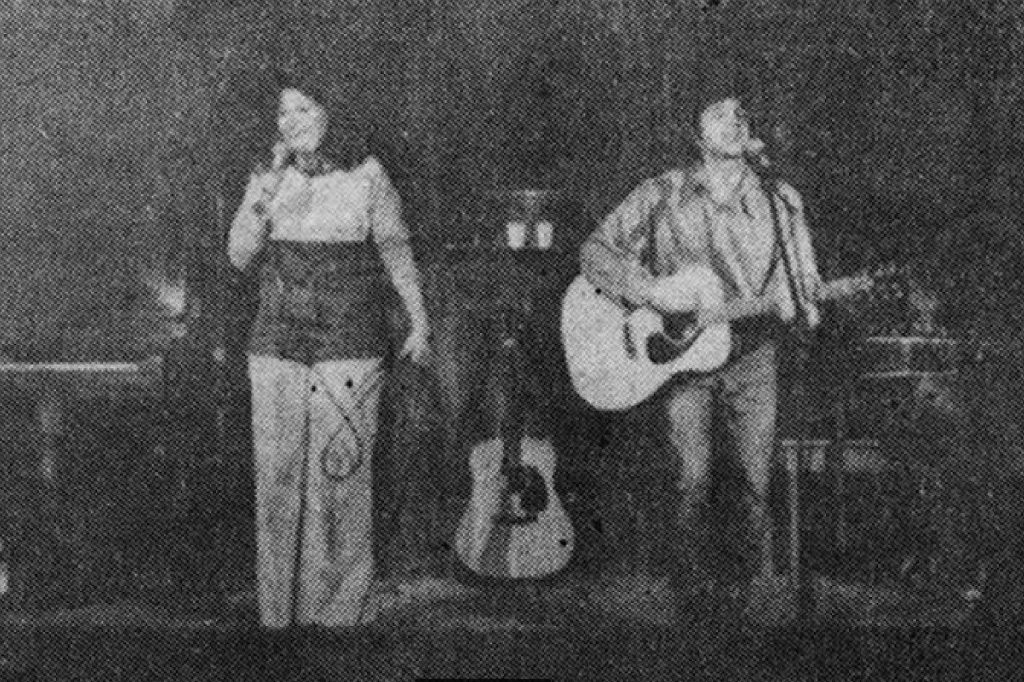Come Out Singing! 2: Lavender Country — Much More than the First Gay Country Album

by Sam Seliger
In 1974, Seattle radio DJ Shan Ottey lost her FCC license for playing a song called “Cryin’ These Cocksucking Tears” on KRAB-FM. The provocative song begins with the line “I’m fighting for the day that there won’t be no straight men,” and its titular refrain violates the FCC’s daytime profanity restrictions. That controversial broadcast was for several decades one of the only indications of the existence of a record called Lavender Country beyond the 1,000 copies it sold in 1973. Lavender Country is often regarded as the first queer country record, but the album is so much more than that — and its radical politics warrant a much closer listen.
The Band’s Background
The record was the sole product of the country band of the same name led by singer and primary songwriter Patrick Haggerty. A product of the Pacific Northwest queer scene of which Haggerty was a part, the band recorded the record with funding from the Gay Community Social Services of Seattle and sold it at queer bookstores and by mail-order in local zines. Being openly gay was enough to banish them from most respectable communities, and making it the subject of their music further alienated them from the country music establishment so that their project was entirely separate.
Haggerty grew up on a rural Montana farm in the years after World War II, working with his family as tenant dairy farmers. He eventually made his way to Seattle for graduate school before dropping out and becoming immersed in the burgeoning LGBTQ+ community, which, in the years following Stonewall, had become a space where queer individuals could live openly with as much safety and freedom as was possible at the time. He formed Lavender Country in this world of radical identity and radical politics: all but one of the musicians were queer activists, and Marxist gay and lesbian community leaders such as Faygele Ben-Miriam played key roles in its development.
Lavender Country, the album, was made by and for this community: it documented their experiences and articulated their philosophies. They did not attempt to share it with a mass audience, since they knew that the record’s content made it unacceptable to the general public. After the initial thousand records were sold, Lavender Country fell into obscurity, and the group stopped playing shows before the decade was through.

The Radical Queer Politics of Lavender Country
Lavender Country was a radical statement of public queer identity and revolutionary politics. Haggerty was and still is a radical: he found his way into the Seattle queer scene through the leftist Gay Liberation Front, and in 1990 he ran for Seattle City Council on a Marxist ticket featuring Black Nationalist candidates, earning 13% of the vote as a result of grassroots community organizing. He often brings up the philosophies of Marx and Hegel in interviews. Lavender Country was an outlet for Haggerty, his bandmates, and their community to define and document their existence on their own terms. It was an act of survival: queer people publicly claiming their right to exist, refusing to be silent or private.
For Haggerty, queerness and radicalism are inseparable: being openly gay is an act of revolution in defiance of a society built on anti-gay structures. By publicly documenting a diversity of experiences of gay life, the record enacts this revolution, proclaiming and embracing the very behaviors that oppressive societal forces seek to hide. The record extends this orientation to political revolution as a necessary facet of openly gay life: if being out is a rebuke of a fundamentally homophobic society, then queer radicalism is the only way to create a world that is safe for gayness and that can fulfill the liberatory promise of coming out.
Beyond simply being a queer document, Lavender Country is also a country album. It’s steeped in tropes and traditions of the genre, with back-country fiddle and steel guitar (and no drums), and songs about cowboys, wanderers, and loneliness. At the time Lavender Country was written, the queer liberation movement was primarily centered in cities like New York and San Francisco, and rural areas were rarely seen as locales for queer life.
Rural communities, and working-class ones especially, are often thought to be more bigoted and homophobic than their urban counterparts, in part due to class prejudices. Making a thematically-queer album of country music, the music most commonly associated with working-class rural communities, upends both notions, arguing that queerness is compatible with rural life by documenting it in a rural language. When they released the record, the band collaborated with RFD Magazine to try to share their message with “isolated gays and lesbians in rural areas” to bring them the radical public identity that being part of a larger queer community afforded.
For the Record
Similarly, Lavender Country sat dormant for over two decades after the group disbanded, until a 2000 feature by Chris Dickinson on gay and lesbian country artists in the Journal of Country Music highlighted the record, giving a short biography of Haggerty and placing it on the timeline of LGBTQ expression in country music.
In those decades of the record’s obscurity, a new generation of queer country voices had emerged, independent of Haggerty and Lavender Country. k.d. lang began as a country singer in the same Pacific Northwest circles, although she did not come out until she began releasing beyond the narrow country music industry. Other gay and lesbian artists emerged in the 1980s and 90s, leading to the formation of the Lesbian and Gay Country Music Association (LGCMA) in 1998, the focus of Dickinson’s article. Although not welcomed by the country music establishment, these artists were out and were making music, having developed their voices without any knowledge of Lavender Country.
“Cryin’ These Cocksucking Tears” was reissued on a 2012 compilation of 1970s gay liberation music, leading to greater attention, culminating in a full-blown reissue of the original record in 2014 by the highly respected indie label Paradise of Bachelors, along with a heavy PR push. Lavender Country was featured in major music publications like Pitchfork and Billboard. Although it has yet to reach universal recognition, the record became somewhat widely known in left-of-center indie music circles.
As attention grew, a narrative increasingly coalesced around Lavender Country that emphasized its status as the first gay country album, often implying that it had been a progenitor of subsequent generations of queer artists. Billboard’s article ran with the web title “How Lavender Country Pioneered Queer Country in 1973” (although the actual headline at the top of the article is different). NowThis ran a short video feature called “How Patrick Haggerty Put Queer Country On The Map.”
Yet this narrative is a flawed depiction of Lavender Country, and what the group and its music were about. It emphasizes their record’s firstness, while overshadowing and overlooking the music’s content. Further, when the record’s content is mentioned, its political radicalism, open sexuality, and targeted anger are often watered down and offered as a secondary point to its temporal status. It is true that Lavender Country was the first professional LP of thematically queer country music, making it a significant landmark in queer public self-expression and an indication of a new era in queer American life. But to focus only on this fact, that queer people expressed themselves on their own terms, is to overlook something far more important: what those people actually said with their expression.
This less than ideal representation exists even in the record label’s promotion. Paradise of Bachelors describes Lavender Country this way: “widely recognized as the first openly gay country music album—and cited as such even by Nashville institutions like the Country Music Hall of Fame and CMT—the landmark self-titled 1973 LP by Lavender Country stands as nothing less than an artifact of courage, a sonic political protest document of enormous power, clarity, and grace.” The record’s institutional credentials, awarded by the same bodies that disregarded it for decades, are given top billing along with its status as first, and the description of its politics fundamentally mellows the radical anger of “Cryin’ These Cocksucking Tears”’s opening lines.

On Closer Listen
Lavender Country should be treated less as a historical milestone than as a document of radical queer self-definition written in the language of the rural working class, because that is what it is. It is important to note that Haggerty is a cisgender white man, a voice that often gets elevated, even in queer circles, at the expense of women, transgender people, and people of color, and that all of the original members of Lavender Country were white.
While addressing this privilege requires also uplifting other voices, the band’s demographics do not invalidate them, and they made efforts to speak to multiple forms of oppression. Haggerty’s songwriting regularly emphasized intersectionality, several decades before the term came into existence, and seemed to acknowledge, albeit indirectly, that one quartet could not speak for an entire diverse movement.
“Straight White Patterns,” for instance, discusses the ways that patriarchy and homophobia make same-sex relationships near impossible, and create special barriers when combined with racism. “To A Woman,” written and sung by fiddler and vocalist Eve Morris, is a lesbian love song worthy of Sappho, allowing a female voice a place to share her perspective. “Back in the Closet Again” addresses racial solidarity most explicitly, with the opening verse picturing an alliance among marginalized groups, with the Black Panthers, the workers’ movement, and gay guerillas coming together to form a liberation army. The second verse illustrates the movement’s collapse due to intergroup prejudices, with dire consequences for all groups, highlighting the need for solidarity between communities.
“Waltzing Will Trilogy”
One of Lavender Country’s clearest and most overt political statements is “Waltzing Will Trilogy,” a chugging bluesy number that rides an acoustic guitar shuffle and galloping piano. With group backing vocals and one of the most compelling melodies on the record, it is as close to a rock song as Lavender Country gets. But in this seemingly upbeat musical setting, Haggerty documents and dramatizes societal violence against queer people on both individual and institutional levels, shining a light on the extreme lengths that society goes to in order to attack queerness while giving faces, names, and pathos to victims.
Through two realistic stories of gay men imprisoned and attacked by institutional anti-gay violence, Haggerty emphasizes the connections between oppressive institutions like the carceral system and allegedly benevolent ones, like psychology and institutional medicine, in enacting anti-gay violence. In a world in which effeminate men are kept in line through electric shock and institutionalization–-in Haggerty’s words, “psychic rape” masquerading as “mental hygiene”–-justice can only come when society reckons with the “straight white honky quacks” behind its institutions.
In the song’s second half, he articulates the cruel irony of a man incarcerated for child molestation because his boyfriend is 17 (a potentially problematic relationship, to be sure — but technically the man could be only a year older, not to mention the fact that heterosexual relationships between adult men and 17-year-old girls often went without a second glance at the time) and is then used by his guards to fulfill their homoerotic urges. Haggerty ultimately calls for violent revolution as the only way to take down the oppressive structures and liberate oppressed victims.
“I Can’t Shake the Stranger Out Of You”
By envisioning queer life as a fundamentally radical act, Lavender Country’s less overtly political moments become some of its most pointed. Haggerty has claimed that he could have become a popular songwriter in Nashville if he wanted to, and this capacity for more universal communication comes through on “I Can’t Shake the Stranger Out Of You,” which poignantly captures the loneliness of gay men when intimate long-term relationships are not an option.
“Stranger” is the only song on the record to not explicitly announce its sexual orientation, but it clearly implies it with its references to horse-riding and the masculinity of both the subject and the singer. It is simultaneously specific and general: though many can relate to the emotional distance of a one-off affair, it was also a situation unique to gay men when homosexual romance was deeply forbidden and many men were not even comfortable with their own sexual identity. Haggerty has said that at the time “gay men had no clue how to have a relationship.”
The song is brilliantly rendered, a rare moment of vulnerability with a sparse arrangement and direct writing that forces the listener to confront its emotional struggle. Haggerty’s songwriting captures the ecstatic thrill of a hook-up with his innuendo–-“you’re hotter than the popcorn dancing in the pan/out to capture a chunk of rapture with someone new”–-yet ends each verse with the titular refrain, which captures a potent longing and unbridgeable distance. Despite the sexual intimacy, there is simply no emotional connection.
“I Can’t Take the Stranger Out Of You” takes on new meaning in the context of Lavender Country’s conception of open homosexuality as an act of political radicalism. The inability of gay men to have fulfilling sexual relationships can at least in part be blamed on the long-term impact of societal and social barriers to male-male romance. In this way, the song indicts homophobic societal forces for the emotional and psychological damage suffered by gay men beyond direct acts of discrimination or abuse.
This depiction is part of what makes Lavender Country so special, using the plain-spoken emotional honesty of country music to articulate the psychological damage of a fundamentally homophobic society. “I Can’t Shake the Stranger Out Of You” is impossible to ignore and can be universally related to, but it has special resonance for the gay men for whom every detail of the song is personally relevant. It speaks to the greater significance of Lavender Country, articulating Haggerty’s experience as a gay man in his own terms against, using his suffering to indict oppressive power structures and his joy to envision a possibility of liberation.
Lavender Country’s Radical Legacy
The resurgence of interest in Lavender Country over the last several decades, especially among broader audiences, is indicative of society becoming more inclusive than it was at the time of the record’s first release. Queer existence and expression are now more widely seen as legitimate and LGBTQ+ individuals are accepted into existing spaces. Although the album is still not recognized by a mainstream audience, it has achieved some manner of renown in the left-of-center community of music aficionados. In that same vein, the flaws in the popular understanding of Lavender Country are indicative of larger inadequacies in queer representation and documentation of queer history: when LGBTQ+ people are included in spaces that are not explicitly queer, which is still not always the case in all circles, they are often reduced to their identity, overshadowing the specifics of their life and work. Such reduction, while still indicative of an important improvement from previous norms of disregard for and hostility towards queer communities and individuals gets in the way of their ability to set their own terms of existence.